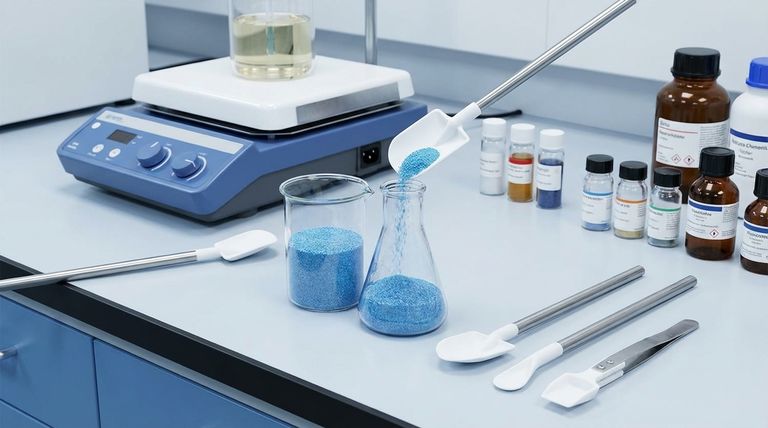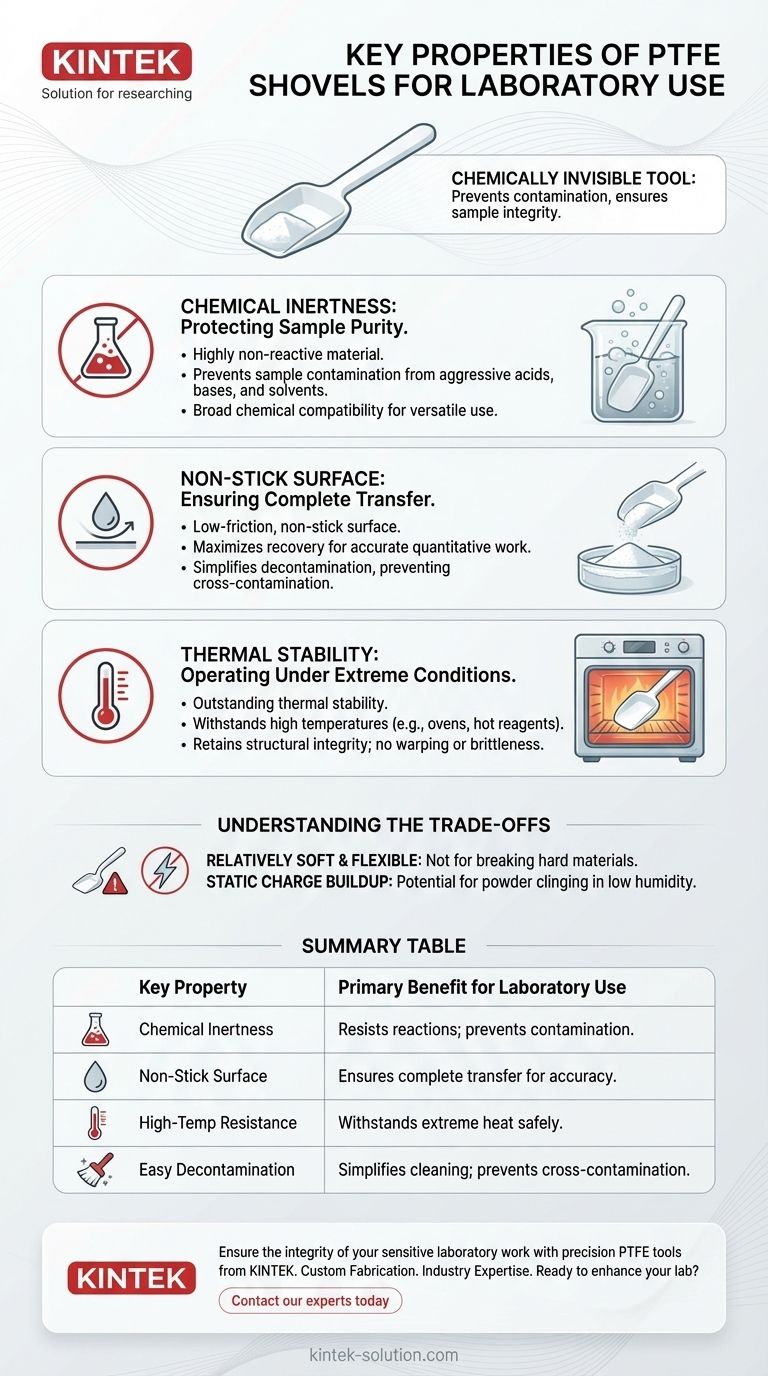In short, PTFE shovels are ideal for laboratory use because of their unique combination of chemical inertness, non-stick surface, and high-temperature resistance. These properties ensure that samples are not contaminated, can be transferred completely, and can be handled across a wide range of experimental conditions.
The core value of a PTFE shovel is not merely its physical shape, but its role as a chemically invisible tool. It allows you to handle, transfer, and manipulate sensitive substances without the shovel itself interfering with the experiment, ensuring the integrity of your results.

Protecting Sample Purity: The Power of Chemical Inertness
What "Inert" Means for Your Work
PTFE, or Polytetrafluoroethylene, is a highly non-reactive material. This means it will not react with the vast majority of chemicals you work with in a lab.
This property is critical for preventing sample contamination. A metal or glass tool might subtly react with or leach into aggressive acids, bases, or solvents, altering your results. PTFE eliminates this risk.
Broad Chemical Compatibility
This chemical resistance makes PTFE shovels exceptionally versatile. They can be used with a wide array of substances without degrading or compromising the experiment's integrity.
Ensuring Complete Transfer: The Non-Stick Advantage
Maximizing Material Recovery
PTFE is renowned for its low-friction, non-stick surface, a property shared with coatings on high-quality cookware.
In a laboratory, this is essential for quantitative work. When you scoop a powder or a viscous substance, the non-stick nature ensures the entire sample is easily transferred to its destination, minimizing loss and improving measurement accuracy.
Simplifying Decontamination
The same non-stick quality also makes PTFE shovels extremely easy to clean. Contaminants and residues do not adhere to the surface, allowing for quick and thorough decontamination between uses, which is critical for preventing cross-contamination.
Operating Under Extreme Conditions: Thermal Stability
Handling High Temperatures
PTFE has outstanding thermal stability. It can withstand severe temperatures without melting, degrading, or losing its shape.
This allows you to safely handle materials in high-temperature applications, such as scooping substances from a drying oven or working with hot reagents.
Maintaining Structural Integrity
Unlike many other plastics, PTFE retains its dimensional integrity even when subjected to thermal stress. It will not warp or become brittle within its operational temperature range, ensuring it remains a reliable tool.
Understanding the Trade-offs
The Issue of Rigidity
While its properties are exceptional, PTFE is a relatively soft and flexible material compared to stainless steel or glass.
This means a PTFE shovel is not the ideal tool for breaking up hard, caked, or solidified materials. Applying excessive force can cause the shovel to bend or become damaged.
Static Charge Buildup
PTFE is an excellent electrical insulator and can be prone to static charge buildup, especially in low-humidity environments. When working with fine, lightweight powders, this can sometimes cause particles to cling to the shovel, making complete transfer more difficult.
Making the Right Choice for Your Application
The decision to use a PTFE shovel should be based on the specific demands of your task.
- If your primary focus is handling aggressive chemicals or sensitive biologicals: The chemical inertness of PTFE is non-negotiable for preventing contamination and sample degradation.
- If your primary focus is the precise quantitative transfer of sticky or expensive powders: The non-stick surface of PTFE ensures maximum material recovery and measurement accuracy.
- If your primary focus is working with high-temperature samples: PTFE's thermal stability provides a safe and reliable way to handle materials that would damage other plastic tools.
Ultimately, choosing a PTFE shovel is an investment in the reliability and integrity of your laboratory work.
Summary Table:
| Key Property | Primary Benefit for Laboratory Use |
|---|---|
| Chemical Inertness | Resists reactions with acids, bases, and solvents to prevent sample contamination. |
| Non-Stick Surface | Ensures complete transfer of powders and sticky substances for accurate measurements. |
| High-Temperature Resistance | Withstands extreme heat for handling materials from ovens or hot processes. |
| Easy Decontamination | Simplifies cleaning to prevent cross-contamination between experiments. |
Ensure the integrity of your sensitive laboratory work with precision PTFE tools from KINTEK.
Our PTFE shovels and components are engineered for the demanding environments of semiconductor, medical, and laboratory industries. We prioritize chemical purity and dimensional stability in every product.
Why choose KINTEK?
- Custom Fabrication: We work with you from prototype to high-volume production to meet your exact specifications.
- Industry Expertise: We understand the critical need for contamination-free handling in specialized applications.
Ready to enhance your lab's capabilities? Contact our experts today to discuss your specific needs for PTFE shovels, seals, liners, and labware.
Visual Guide

Related Products
- Custom PTFE Parts Manufacturer for Teflon Parts and PTFE Tweezers
- Custom PTFE Parts Manufacturer for Teflon Containers and Components
- PTFE Chemical Solvent Sampling Spoon
- Customizable PTFE Scrapers and Shovels for Demanding Applications
- Custom PTFE Measuring Cylinders for Advanced Scientific and Industrial Applications
People Also Ask
- What are the advantages of the PTFE bottle's non-stick surface? Ensure Purity and Efficiency in Your Lab
- What are the key components of the Low-Bleed PTFE/Silicone headspace septa and their functions? Ensure Sample Integrity in GC Analysis
- What are the benefits of silicone/PTFE liners? Ensure Unmatched Sample Purity and Integrity
- What role does precision play in the use of PTFE silicone septa for pharmaceutical analysis? Ensure Reliable, Compliant Data
- What are the best practices for using PTFE syringe filters? Achieve Pure, Reliable Filtration
- What makes PTFE lined vials easy to clean? The Science Behind Their Non-Stick, Inert Surface
- What are the benefits of selecting the appropriate PTFE-coated septum for chromatography? Ensure Accurate & Reproducible Results
- How do PTFE/silicone septums help reduce sample contamination in chromatography? A Dual-Layer Defense for Your Samples



















